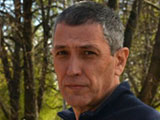The Stone-Throwing Analyst
by Israel Centeno and translated by Kelly V. Harrison / September 10, 2013 / No comments
Political analyst or disruptive propagandist? A disturbing trend in newspaper editorials.

Photo: Tal Bright via Flickr.
Typically, when someone takes an interest in a political reality outside of the scenario they exist in, they turn to various sources, news outlets, and analysts who cover and dissect it. They read two, three, or however many relevant analyses surrounding the event, compare them, and then venture an opinion.
A week ago, I turned to the political analysis pages of a couple of newspapers that I usually read, which respond to conflicting editorial viewpoints. What was the result? I read pieces by analysts who were probably as removed as I was from the events taking place. In every one of the analyses, instead of observation, I found a series of convictions and priestly sermons.

- From his lonely watch post Albert Camus asked who among us has not experienced exile yet still managed to preserve a spark of fire in their soul. “We’re all alone,” Natalia Sedova cried in exile on hearing of her husband Leon Trotsky’s affair with Frida Kahlo. In his novel Night Watch, Stephen Koch follows the incestuous love affair of David and Harriet, wealthy siblings watching the world from their solitary exile. Koch’s writing, Camus’s theories, and Trotsky’s affair all come back to exile and lead me to reflect on the human condition. From my own vantage point, my Night Watch, I will reflect on my questions of exile, writing, and the human condition.

- Israel Centeno was born in 1958 in Caracas, Venezuela, and currently lives in Pittsburgh as a Writer-in-Residence with City of Asylum/Pittsburgh. He writes both novels and short stories, and also works as an editor and professor of literature. He has published nine books in Venezuela and three in Spain.
However gripping the subject may be, analysts should cool their passion and look for different points of view. They are not gamecocks, attacking their readers by berating and blaming them via Twitter. Similarly, an analyst doesn’t write for laudatory readers who already subscribe to the ideas they propose. The exact opposite is true; often op-ed writers go against the social current and put forth arguments for readers who don’t share their views.
Last week I read pieces by two Venezuelan writers who picked apart not only those who disagreed with their opinions, but also those who disagreed with the political strategies of the parties they were apparently responding to. I have always wanted to believe that a good op-ed writer is not a branch of the party machine, but the opposite: Someone with the freedom and ability to give an opinion that can be used to interpret a reality from outside the situation.
Analysts interpret. They don’t rebuke, punish, exclude, or explain; that is the job of a propagandist.
Currently, Venezuela is going through quite a miserable time with regard to freedom and diversity of opinions and ideas. This is not just because of the imposition of State censorship and self-censorship, but because, in a dynamic without nuance, active participation and commitment are demanded of those who seek clarification above and beyond the prejudices of an ideological or strategic dogma. If not, one ends up a spokesperson, voicing the anger of “the masses,” “the nation,” and “the people.”
In a polarized game, regrettably, an “opinion” prevails when stones are hurled as much at those who question official lines as at those who question the opposing position. However, the matter is getting worse. Or, at the very least, it is turning into a grotesque farce in which the instigator leading the stone-throwers is the person from whom we expect to hear an interpretation that, if not unbiased, is concerned with providing objectivity in an analysis of a reality that, on the whole, they almost always disrupt.




